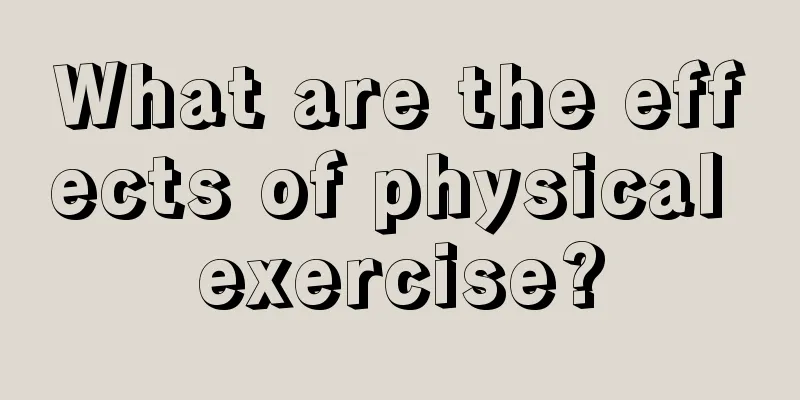What are the effects of physical exercise?

|
There are many benefits of exercise, especially for teenagers. Doing more physical exercise can lay a solid foundation for the developing body. This will also be of great benefit to physical development, and the physical fitness will be much stronger than that of children who do not exercise. For teenagers, more exercise can greatly improve their cardiopulmonary function. So, what is the best way to exercise? What are the effects of physical exercise? For adolescent children, the benefit of exercise is that it can promote bone growth and thickening, increase bone density and increase bone weight. Children who love to do sports have strong muscles. This is because exercise allows their muscle fibers to grow, increasing muscle strength and endurance. Data shows that people who don't like to exercise have muscles that only account for about 40% of their body weight, while people who exercise regularly (such as competitive athletes) have muscles that weigh 45%-50% of their body weight. In addition, data also shows that regular physical exercise can increase bust size, shape your body without gaining weight, increase height without losing bone mass, keep your body proportions coordinated, and make you look more beautiful! The heart is the center of the circulatory system. Data show that people who exercise regularly have larger hearts than the average people, have fewer pulses per minute when they are at rest than those who do not like to exercise, and have a greater stroke volume than those who do not like to exercise. People who do not like exercise have a blood output of about 5000 ml per minute when they are calm, and about 20,000 ml per minute during strenuous exercise. However, people who exercise regularly can have a blood output of up to 35,000 ml per minute during strenuous exercise. Adolescence is a period when physical exercise is more effective. If physical exercise is strengthened during adolescence, the benefits of exercise will continue throughout one's life. The nervous system is the headquarters of the human body, and its blood and oxygen requirements are greater than those of ordinary organs. As we said before, physical exercise can improve the functions of the respiratory and circulatory systems, increase oxygen intake and blood output, and enable nerve cells to obtain a more adequate supply of energy and oxygen, which is beneficial to the normal and efficient work of the nervous system, especially the brain, and has a significant effect on improving the intensity, balance, and flexibility of the neural working process. The above is an introduction to the effects of physical exercise. We can know that there are many benefits of youth exercise, not only physical development, but also the nervous system will be greatly improved. Exercise can keep the nervous system excited, eliminate fatigue and keep the mind clear, so the role of physical exercise on teenagers is endless. |
<<: What are the dangers of excessive exercise?
>>: What are the principles of physical exercise
Recommend
How to exercise back muscles effectively
The human body is made up of many muscles, and it...
What are the exercises to strengthen waist strength?
The waist is the most important part of our body....
Is it suitable for women to practice yoga during menstruation?
Yoga has become a fashionable lifestyle, because ...
What are the benefits of brisk walking for an hour every day?
I think everyone may understand the importance of...
Biceps stretch_biceps stretch
Nowadays, people know that they need to exercise ...
You can lose weight without sweating, anyone can do it
Taking up too much space, peaceful and relaxing y...
How long after a meal is the right time to exercise?
We all know that proper exercise after a meal can...
How to exercise abdominal muscles?
The formation of muscles requires a long process,...
Exercises in bed can show your agility
Stretching when you wake up in the morning is the...
What are the effects of physical exercise on the body
Many people don't like to exercise, which is ...
Is it good to run before dinner at night?
Maybe many of us choose to run before dinner at n...
How to stretch the deltoid muscle
Many women have a slim figure, but for men, being...
The relationship between men’s fitness and sex! You must understand
Men who exercise regularly have much greater sexu...
Men and women must control the "frequency" when doing this
Rest is necessary when doing muscle training, but...
The correct training method for straight leg raise
Leg training plays an important role in sports. O...









